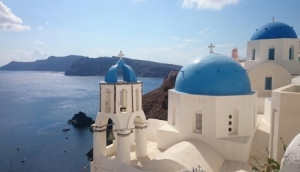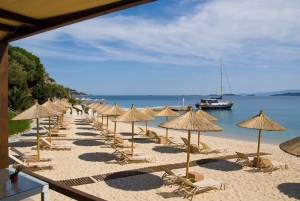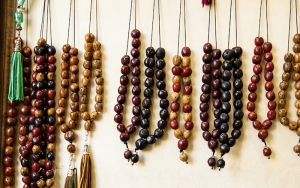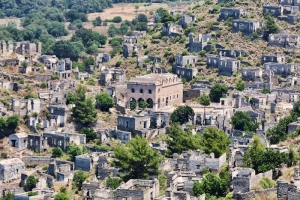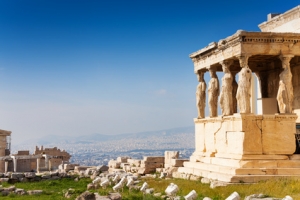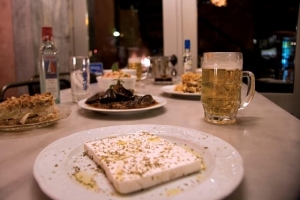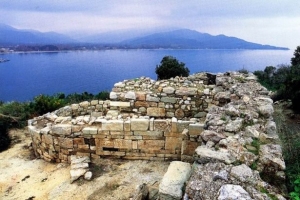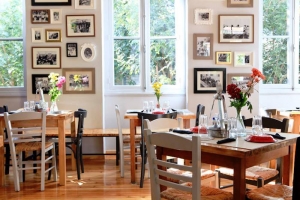ABOUT US
XpatAthens
Monday, 13 June 2016 07:00
Kalimera Santorini: 3 Days On A Greek Island
If you’re heading to Santorini this summer, this article is for you! Recently listed as the #1 island in Europe, Santorini is on the list for many. Blogger, Laura Burgess, writes about her perfect itinerary for visiting this Greek island, as well as great places to stay, how to get there, and what to pack with you!
Day 1
8:00 am: Walk to Firá and grab a fredo espresso (iced espresso) and a pastry at the bakery in the main square. The fredo espressos are some of the best in the region and it’s a perfect way to start a busy day.
9:00 am: Meet your tour guide in the center of Firá who will take you on a walk of a lifetime. Santorini Walking Tours offers four walking tours, but a must-see is the Firá to Oia Caldera hike. You won’t be disappointed, trust me.
1:00 pm: After you finish your walking tour, you will have landed in Oia, the colorful, boutique-y village that is one of the prettiest spots in Santorini. Definitely spend some time here eating, shopping, and exploring all the cobbled secret passageways. Have lunch on the terrace at Melitini and enjoy more caldera views while you sit back and enjoy a nice mezze, aka tapas, style lunch and of course, a glass of wine.
3:00 pm: Oia is the place to shop with plenty of boutiques offering women’s contemporary fashion, jewelry, and artwork. Check out the world famous Atlantis Books and AK Gallery, two don’t miss stops while you are there.
6:00 pm: Grab an ice cream and head down to Katharos beach in Oia just in time for a mini-siesta and to watch the applause worthy sunset. Katharos beach is my favorite place to watch because it’s peaceful and away from the “sunset crowd.” If you wish to be a part of the crowd, go towards the windmill and grab a seat anywhere. As the sun sets, you will hear lots of applause. It’s silly, but it makes me smile every time.
8:30 pm: Once the sun goes down, you will probably be tempted to head back to Firá, but I recommend staying in Oia just a bit longer and grabbing a drink at MaryKay’s bar, which is right across from Atlantis Books. They have excellent cocktails and always offer a little snack to hold you over until dinner. The buses back to Firá are chaotic and crowded just after sunset so it’s optimal to sip a tasty beverage while you wait for the crowds to disperse.
9:30 pm: Catch the bus back to Firá and head towards the main square. Do as the locals do and grab a souvlaki and Yellow Donkey beer while you sit on the benches and people watch. The square is always buzzing with activity and you just can’t beat Greek souvlaki!
Day 1
8:00 am: Walk to Firá and grab a fredo espresso (iced espresso) and a pastry at the bakery in the main square. The fredo espressos are some of the best in the region and it’s a perfect way to start a busy day.
9:00 am: Meet your tour guide in the center of Firá who will take you on a walk of a lifetime. Santorini Walking Tours offers four walking tours, but a must-see is the Firá to Oia Caldera hike. You won’t be disappointed, trust me.
1:00 pm: After you finish your walking tour, you will have landed in Oia, the colorful, boutique-y village that is one of the prettiest spots in Santorini. Definitely spend some time here eating, shopping, and exploring all the cobbled secret passageways. Have lunch on the terrace at Melitini and enjoy more caldera views while you sit back and enjoy a nice mezze, aka tapas, style lunch and of course, a glass of wine.
3:00 pm: Oia is the place to shop with plenty of boutiques offering women’s contemporary fashion, jewelry, and artwork. Check out the world famous Atlantis Books and AK Gallery, two don’t miss stops while you are there.
6:00 pm: Grab an ice cream and head down to Katharos beach in Oia just in time for a mini-siesta and to watch the applause worthy sunset. Katharos beach is my favorite place to watch because it’s peaceful and away from the “sunset crowd.” If you wish to be a part of the crowd, go towards the windmill and grab a seat anywhere. As the sun sets, you will hear lots of applause. It’s silly, but it makes me smile every time.
8:30 pm: Once the sun goes down, you will probably be tempted to head back to Firá, but I recommend staying in Oia just a bit longer and grabbing a drink at MaryKay’s bar, which is right across from Atlantis Books. They have excellent cocktails and always offer a little snack to hold you over until dinner. The buses back to Firá are chaotic and crowded just after sunset so it’s optimal to sip a tasty beverage while you wait for the crowds to disperse.
9:30 pm: Catch the bus back to Firá and head towards the main square. Do as the locals do and grab a souvlaki and Yellow Donkey beer while you sit on the benches and people watch. The square is always buzzing with activity and you just can’t beat Greek souvlaki!
To read the rest of Laura's Santorini itinerary, please visit: Daytripper 365
Published in
Travel Greece
Tagged under
Monday, 13 June 2016 07:00
Metropolitan Cathedral Of Athens To Be Revealed In July
The Metropolitan Cathedral of Athens will reopen its gates on 2 July after several years of restoration. The restoration project, which was affected by earthquakes and stalled the project, will include an installation of external lighting to bring out the Cathedral’s best features.
The installment of external lighting was the last project left before the completion of the Cathedral’s restoration, static enforcement, and conservation of decoration.
The head of the Technical Service of the Archbishop of Athens, Theodoros Chamalis, said the sanctification of the restored church will take place on 2 July, with a Holy Mass taking place on 3 July, which will be the first mass in seven years.
To read this article in full, please visit: Greek Reporter
Published in
Local News
Tagged under
Tuesday, 07 June 2016 11:18
Greece Hoists Blue Flags At 430 Beaches Countrywide
Run by an independent non-profit organization, Foundation for Environmental Education (FEE), the Blue Flag Program labels beaches and marinas — and for the first time this year sustainable boating tourism operators — appropriate for swimming based on cleanliness, water quality, organization, safety and services, environmental management, and protection and certifies the best every year ahead of summer.
This year, 3,462 beaches and 660 marinas in 50 countries were inspected. With 430 beaches and nine marinas, Greece clinched third spot during the 1st International “Blue Flags” Awards ceremony held in the Halkidiki peninsula at the Porto Carras Grand Resort. The Halkidiki peninsula was crowned the destination with most flags in Greece as 52 of its beaches were honored.
Greece also recently came in 4th in Europe with the European Environment Agency verifying that 97.2 percent of its beaches are of the highest quality for swimming.
To read this article in full, please visit: Greek Travel Pages
For an interactive map of all the beaches and to learn more about the Blue Flag, please visit: Blue Flag
For an interactive map of all the beaches and to learn more about the Blue Flag, please visit: Blue Flag
Published in
Greece In The News
Tagged under
Tuesday, 07 June 2016 07:00
Yannis Behrakis - 2016 Pulitzer Prize Winning Photojournalist
Meet Yannis Behrakis, a Pulitzer Prize winning photojournalist from Athens. Bekrakis, along with his team from Thomson Reuters, won the esteemed prize in 2016 for Breaking News Photography for the coverage of the European refugee crisis.
Behrakis studied photography at the School of the Arts and Technology and received his BA from Middlesex University. While in Athens, he started working as a studio photographer and then as a contractor for Reuters. Behrakis was offered a staff position in 1988 and has worked there ever since, documenting many cultural and historic events.
In this exclusive interview with Greek Reporter, Behrakis discusses his experience documenting the refugees and how important it was to him to be able to share their stories.
For more information on Yannis Behrakis, please visit: Greek Reporter
For more information on Yannis Behrakis, please visit: Greek Reporter
Published in
People
Tagged under
Tuesday, 07 June 2016 07:00
Greek Komboloi - Lord Of The Beads
The Greek komboloi, or worry beads, are a string of beads used to pass the time and is a unique tradition in Greek culture!
An object of art; a source of solace; a makeshift musical instrument… a true Greek komboloi is all that – and more. I would prefer an original komboloi over a vast choice of souvenirs from my Athens trip. Even as an Athenian, I very often look for one to give as a special present. It is always a pleasure to pair the right piece with the right owner and almost everyone appreciates the gift.
There are enough kinds, sizes and textures of them to match with any distinct personality. For my husband, who plays a mean bouzouki in his rare free time, I opt for an old-fashioned item: heavy, with “singing” dark amber beads, and a fat silk pom-pom tying up the whole ensemble. I know he will not carry it with him at all times, not like the old Athens and Piraeus rembetes of the 1930s. They were the legendary musicians of the “Greek blues”. For them, their komboloi was an extension of their hands. For us, it is a charming ornament. It will sit invitingly on the table next to my husband’s bouzouki, both of them silently calling us to pick them up and just make a night of it.
For my mom, who is forever trying to break free of a nasty cigarette habit, I chose a begleri: the little brother of the komboloi, with fewer beads, no pom-pom, popular with both men and women. Stylish, playful, and an all-time favorite helper for quitting smoking, long before pills, e-cigs or weird devices were around.
How will you know when you have found the One? It may be the colors that catch your eye. It may be the shape of the beads, or some other unique detail about this komboloi that makes it special to you. But you will know it is “yours” almost immediately. Now, go ahead and give it a try. Measure it for weight and size in your palm. Roll it around your fingers. Focus on the hypnotic “click” of the beads. Feel the soft touch of the pom-pom, the caress of the hard silk string that holds the beads together (always a well-made string, never metal or the insult of plastic for me, thank you very much!).
Allow this mysterious, time-transcending object to lure you to a place and time far, far away from the static of the digital age.
“Click” it to connect, not to your daily schedule or social network, but with your inner quiet place.
To read this article in full, please visit: Greece Is
Image credit: Dimitris Vlaikos
To read this article in full, please visit: Greece Is
Image credit: Dimitris Vlaikos
Published in
Greek Language & Culture
Tagged under
Thursday, 09 June 2016 07:00
Filmmaker Documents Greek Ghost Town Of Levissi
Dating back 5,000 years, the Greek Orthodox town of Levissi, once known as Kayakov, was a village of 10,000 people. However, in 1922, the village went through an ‘ethnic cleanse’ and the people were forced to leave their land and heritage. Now, American filmmaker Joerg Schodl has documented what is left of Levissi in his documentary ‘Ghosts of Levissi.
Schodl tells the tale of the small Greek community in Asia Minor that was torn apart during the final days of the Ottoman Empire. It focuses on the disappearance of the population practically overnight thanks to campaigns, designed to scare Greeks from Levissi and nearby Macri (known as Fethiye), included offensives by Turks.
Since then, the homes have remained vacant, left to decay after being further damaged by a huge earthquake in 1957. The land, however, has been used for summer festivals, but the plan to lease the area and auction it off for commercial interests are causing an uproar among Turks and Greeks with roots to Levissi.
Schodl had the help of members from the Greek community in Melbourne, Adelaide, Sydney, Perth, and Brisbane and he was able to find thirteen descendants of Levissi families. More descendants were found in Toronto, Rhodes, London, Athens and Istanbul.
To read this article in full, please visit: Greek Reporter
See the Ghosts of Levissi trailer here:
To read this article in full, please visit: Greek Reporter
See the Ghosts of Levissi trailer here:
Published in
Greece In The News
Tagged under
Monday, 06 June 2016 07:00
Miracle In Athens As Greek Tourism Numbers Keep Growing
For an economy stuck in depression-era recession, dependent on emergency bails, and seemingly locked in a perpetual fiscal vice, tourism is vital. A record 23.5 million holidaymakers visited Greece in 2015 – generating €14.2bn in direct receipts, or 24% of gross domestic product.
“It’s a miracle, what’s been happening in Athens,” Greece’s tourism chief, Andreas Andreadis, told the Observer. “The tourist industry in Greece grew two to three times faster than in Spain, Portugal, Italy or France last year. This year we expect around 4.5 million visitors in Athens alone.”
It’s been a busy winter in downtown Athens, where scaffolding, tarpaulins and dust have been symbols of hope: a mini construction boom heralding a tourist renaissance. Nine hotels are being built or restored around the city centre.
This year, the Greek Tourism Confederation is predicting the number of visitors could reach 25 million and 27.5 million if you count the cruise ship passengers. Economic recovery depends on the tourism sector to a great degree.
Much of the upsurge is linked to Greece’s safety record. Tourists are staying away from resort in Egypt, Tunisia, Turkey and elsewhere in the wake of high-profile attacks.
Tourism provides one in five jobs in Greece, at a time when unemployment in the nation has hovered stubbornly around 25%. Youth unemployment stands at an astonishing 67%.
“It’s going to be a challenge but our hope is that we will see an improvement on record numbers again,” said Yiannis Retsos, president of the Hellenic Federation of Hoteliers. “Tourism is all about positive psychology and Greece is a safe place in the south-east Mediterranean region.”
To read this article in full, please visit: The Guardian
Published in
Local News
Tagged under
Thursday, 02 June 2016 07:00
Top Things To Eat And Drink In Athens
Travel blogger and author Rebecca Hall, shares her advice on the best dishes and drinks in Athens and the local spots to find them! Here are just a few:
1. Koulouri
This tasty snack is a simple ring of bread sprinkled with sesame seeds or cheese and olives and is sold from koulouri stands all over the city.
Where to Get Koulouri: To koulouri tou Psyri is the bakery that supplies the majority of stands in the Athens area, and it is located in the Psyri neighborhood of Athens, near Monastiraki.
2. Souvlaki
The Greek version of fast food, it’s actually quite healthy. Souvlaki (loosely translated “little skewer”) is cubes of grilled pork or lamb on a stick. Most often it is served with tomato, onion, parsley, tzatziki and fries wrapped in pita bread.
Where to Get Souvlaki: The locals tend to go to Kosta’s, operating since 1950 and located just off Mitropoleos Street near Syntagma Square.
3. Greek Coffee
Ground coffee beans and cold water are slowly brought to a boil in a small pot called a briki with your desired amount of sugar . Then the sweetened coffee is poured into your cup. Like everything else in Greece, it’s designed to be enjoyed slowly.
Where to Find Greek Coffee: Greek coffee can be ordered in any café, but the best non-touristy places in central Athens are located in Iroon Square in the neighborhood of Psiri, near Monasteraki.
To read this article in full, please visit: On Board
To read this article in full, please visit: On Board
Published in
Greek Food & Diet
Tagged under
Thursday, 02 June 2016 07:00
Greek Archaeologist Claims He Found Aristotle’s Tomb At Stagira
A Greek archaeologist, who has been excavating Ancient Stagira in central Macedonia for the last 20 years, has claimed he found the tomb of Aristotle. At a conference in Thessaloniki to commemorate the 2,400th anniversary of Aristotle’s birth, the archaeologist, Konstantinos Sismanidis, said he was almost certain that what he found was Aristotle’s tomb.
Even though Sismanidis and his team have no definitive proof that what they found is Aristotle’s tomb, there are strong characteristics that led them to believe this was in fact the tomb. The characteristics include the location and panoramic view, its position at the center of a square marble floor, and the time of its construction, which started at the beginning of the Hellenistic period. The tomb, according to Sismanidis, was built in honor of Aristotle after his death in 322 B.C.
In addition to finding the tomb, Sismanidis and his team of archaeologists have also found the altar referred to in ancient texts and the road that leads to the tomb.
Another excavation that took place in 2014 in Amphipolis, northern Greece, led to the discovery of the largest ancient tomb ever found in Greece. There was speculation that the tomb belonged to Alexander the Great, Aristotle’s most famous student, but later evidence showed that the tomb had probably been built for a close companion of the king and conqueror.
To read this article in full, please visit: NY Times
Published in
Greece In The News
Tagged under
Tuesday, 31 May 2016 07:00
Two Athens Eateries Among Best Places To ‘Eat At Before You Die’
The popular news and media source Buzzfeed recently released their list of ’31 Places Around The World You Should Eat At Before You Die,’ and two of Athens’ restaurants made the list! The compilation includes a variety of locations and culinary offerings that certainly do not disappoint, as recommended by a cultured group of globetrotters.
One of these globetrotters is Jess Brammar, the senior broadcast journalist on the BBC’s “Newsnight” program. She focused her attention on an Exarchia eatery that provides a spectacular setting of central Athens. According to Brammar, at Ama Laxei the food you will encounter is nothing short of amazing. She describes it as “traditional Greek with a modern twist”. Full of salads and large plates to share, Ama Laxei provides an ideal dinner for larger parties and socialites.
Ama Laxei: Kallidromiou 69, 210 384 5978
Ama Laxei: Kallidromiou 69, 210 384 5978
Athens scores another spot on the list with one of its notable restaurants Seychelles, located in the neighborhood of Metaxourgeio. Jon Henley, a feature writer for the popular news and media company Guardian, dines at this casual hangout and gives and gives credit to its authentically Greek, yet satisfyingly inventive cuisine.
Seychelles: 49 Kerameikou Street, 211 183 4789
Seychelles: 49 Kerameikou Street, 211 183 4789
Reviewers managed to hit a wide variety of cities that takes readers on a trip across the globe. The list highlights Umm Hagar, found in the center of Cairo, Egypt, Armand’s Bistro in Cambodia, Vijay’s in the northwest of London, and Don Alfonso overlooking the Amalfi coast and Sorrento.
To see the full list of Places To Eat At Before You Die, please visit: Buzzfeed
Published in
Restaurants In Athens
Tagged under

